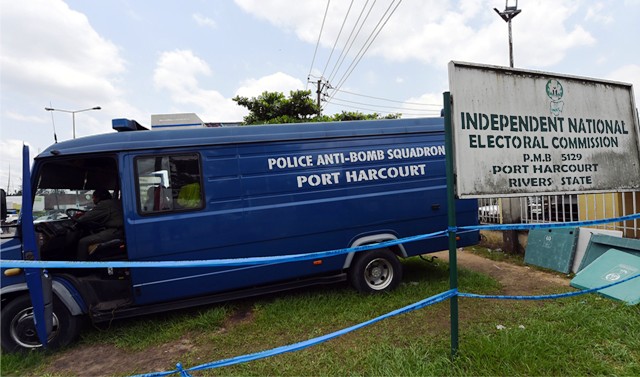News
Election Violence: RSG Seeks Compensation, Sanction Against Security Officers …Gberegbe’s Father Calls For Justice …Army Staged Coup Against Rivers -Wike

The Rivers State Government has called for disciplinary action against erring security officers found culpable in the violence and killings that rocked the February 23 Presidential and National Assembly and March 9 gubernatorial and House of Assembly elections in the state.
This formed part of the submissions made by the state government during the two-day public sitting of the Joint House of Representatives Committee on the Army, Police, Justice and Human Rights in Port Harcourt, on the violence and killings that engulfed the state during the just-concluded elections.
The committee was set up following a motion by Hon Kingsley Chinda, representing Obio/Akpor Federal Constituency on the floor of the House, penultimate week, over the murder Dr. Ferry Gberegbe and Ibisaki Amachree, among others.
Speaking through Commissioner for Justice and Attorney General of the state, Dr Zacheaus Adangor, the governor, among other prayers, sought for the immediate redeployment of the General Officer Commanding 6 Division of the Nigerian Army, Maj-Gen Jamil Sarham, payment of compensation by the Army to families of those killed and unlawfully arrested during the elections.
From figures made available to The Tide, about 13 persons were killed in Akuku-Toru as 23 sustained injuries, while in Ahoada-West, about 30 persons were arrested and manhandled, just as in Andoni, five were detained.
Similarly, Tai had 11 persons detained while in Opobo/Nkoro, 15 persons, including the state Commissioner for Education, Dr. Tamunosisi Gogo-Jaja were also illegally detained.
Meanwhile, Gogo-Jaja and Peoples Democratic Party stalwart in Asari-Toru, Chief Pawariso Horsfall have recalled the trauma and abuse they suffered in the hands of the Army before and during the general election.
Gogo-Jaja explained that his house was ransacked, as his wife and children suffered psychological trauma, while his visitors were manhandled on March 7.
Though he was released after questioning on suspicion of harbouring criminals at his home, he alleged that he lost valuables, including N1.5million.
On the hand, Horsfall narrated how his house was vandalised by suspected soldiers who claimed they were searching for criminals.
He narrated how one Captain Balarabe led soldiers who stormed his house at about 1.30am and another Supol Abu, who led a police team to search his home thereafter.
However, the Army authorities have denied involvement in the alleged acts.
Representative of the Nigerian Army during the committee’s sitting, Brig-Gen Felix Omogui, maintained that the Army complied with clearly spelt out rules of engagement.
Omogui said, “On the alleged murder of Mrs Amachree, it’s laughable that we will kill a law-abiding citizen”, as he added, there were cases of unknown soldiers, “we had so many cases and arrested many of them.”
However, the House of Representatives Committee investigating killings and violence during the general election in Rivers State has sued for peace and healing in the state.
The Chairman of the committee, Hon. Rimande Kwenum, who made the prayer, yesterday, as the committee rounded up its public hearing in Port Harcourt, said the panel was set up to avert such violence in the future and ensure healing in the state.
He frowned at the way security agencies conducted themselves but said there was need for preventing such in the future, as he called on the political class to mend fences.
The same view was expressed by Hon. Kingsley Chinda, representing Obio/Akpor Federal Constituency in the House, and who moved the motion for the committee’s investigation.
Chinda held that the elections in Rivers State were more of a battle field with F-SARS and Army being major actors.
He argued that the action of both the Army and police was unconstitutional, and therefore, the panel was set to straighten the system to avert future occurrence.
“I will continue to raise issues that border on the sanctity of the nation…It’s only truth that can heal wound, but if we sweep truth under the carpet, it can aggravate the situation”, he further submitted.
Meanwhile, the father of murdered lecturer and Ogoni youth leader, Dr Ferry Gberegbe, during the just-concluded guber and House of Assembly elections, yesterday, prayed for justice over his son’s death.
Mr. Conduct Gberigbe while praying the House of Representatives Committee on the Army, Police Affairs, Justice and Human Rights during a two-day public hearing on the violence and killings in Rivers State during the general election, stressed that those who killed his son should be brought to book.
The former police officer, who came with pictures of late son as a teenager, shed tears as he recalled the closeness he shared with late Dr. Gberegbe.
News
Fubara Attends PDPGF Meeting In Asaba …..Back Court Verdict On National Secretary Position

Rivers State Governor, Sir Siminalayi Fubara, last Friday, attended the Peoples Democratic Party Governors’ Forum (PDP-GF) meeting in Asaba, the Delta State capital.
The Rivers State Governor, who is the Vice Chairman of the PDP Governors’ Forum, attended the meeting, alongside 10 other Governors of the party’s controlled states across the six geopolitical zones of the country.
The first PDPGF meeting in 2025, was held at the Government House in Asaba, at the end of which a seven-point resolution was reached.
Reading the communique at the end of the meeting, the Chairman of the Forum, and Governor of Bauchi State, Senator Bala Mohammed urged the National Working Committee (NWC) to put every machinery in place to ensure a hitch-free NEC meeting on March 13, 2025.
The communique stated:
“The Forum, having examined all the notices required by law to be given to validly convoke NEC, advised NWC to reschedule NEC to the thirteenth (13Th) of March 2025.”
The Forum further noted the Court of Appeal judgment affirming Udeh Okoye as the National Secretary of the party, saying that as a party that believes in the rule of law, it will respect the position of the Appellate Court on the matter.
“The Forum noted with delight the ongoing efforts at resolving the crisis in the National Working Committee, NWC, on the position of the National Secretary, and has reaffirmed its support for the Court of Appeal judgment; consequently, the Forum advised the NWC to set up the machinery for the effective implementation of the court judgment.
“While commending the country’s valiant and patriotic Armed Forces and Security Agencies for maintaining the frontline in securing the country and the gains of our gallant personnel against bandits in parts of the country, the Forum viewed with deep concern, the resurgence of brazen non-state actors. It, therefore, calls for the strengthening of the nation’s security architecture.”
Governors in attendance include: H.E Senator Bala Abdulkadir Mohammed (Bauchi State); H.E Sir Siminalayi Fubara (Rivers State) – Vice Chairman; H.E Rt. Hon. Sheriff Oborevwori (Delta State) – Host; H.E Dr. Agbu Kefas (Taraba State); H.E Rt. Hon. Ahmadu Umaru Fintiri (Adamawa State); and H.E Dr. Dauda Lawal (Zamfara State).
Others are H.E Senator Ademola Adeleke (Osun State); H.E Senator Douye Diri (Bayelsa State); H.E Pastor Umo Eno Ph.D (Akwa Ibom State); H.E Dr. Peter Mbah (Enugu State); H.E Barr. Caleb Mutfwang (Plateau State);
and H.E Bayo Lawal (Deputy Governor, Oyo State), who represented Governor Seyi Makinde.
News
NGO Implants Free Pacemakers Into 22 Cardiac Patients In PH
A United States based Non Governmental Organisation, Cardiovascular Education Forum, in collaboration with the University of Port Harcourt Teaching Hospital (UPTH), has successfully implanted free pacemakers into 22 patients with different cardiac cases in Port Harcourt.
This is in a bid to save lives and encourage patients with low heartbeats to live longer.
The implantable device, which costs $20,000 each, was inserted free of charge on the selected patients.
Speaking during a Special Hospital Ground Rounds at the UPTH with its Theme, “Recent Advances in Cardiac Pacing,” a cardiac Physiologist, Dr Neil Grub, said the NGO was in Nigeria to improve training and learning on cardiac issues and help patients with cardiac problems.
Accompanied by a team of experts comprising a cardiologist and cardiac device implanter, Dr Jagdeep Siagh, and UPTH interventional cardiologist, Dr Edafe Emmanuel, Dr Grubb said pacemakers were inserted on patients with low heartbeats to boost their heart rates.
Earlier, the Chief Medical Director, UPTH, Prof Henry Arinze Ugboma, said each of the implantable devices cost over $20,000.
Ugboma, represented by the Chairman, Medical Advisory Committee, UPTH, Prof Datonye Alasia, said the partnership between UPTH and the foreign NGO was to build networks, and improve services in terms of healthcare delivery, training and learning.
According to him, there is now a ray of hope in terms of treatment of patients with cardiovascular cases in the hospital.
He said the UPTH started the collaboration with Cardiovascular Education Forum in 2018 to boost health, training and learning on cardiac health.
He assured that, “in coming years, the scale of our collaboration with the mission will be higher.”
Chinedu Wosu
News
FG Unveils National Broadband Alliance To Drive Internet Access
The Federal Government has unveiled the National Broadband Alliance, a new initiative aimed at transforming the nation’s digital infrastructure and boosting connectivity across the country.
The initiative was unveiled yesterday in Lagos by the Minister of Communications, Innovation, and Digital Economy, Bosun Tijani, who was represented by the Executive Vice Chairman of the Nigerian Communications Commission, Aminu Maida.
In his address, Tijani stated that NBAN would significantly enhance broadband penetration, which has grown from just six per cent in 2015 to approximately 42 per cent as of October 2024.
To support this agenda, he said the government was leveraging a Special Purpose Vehicle to deploy 90,000 km of fibre backbone across the nation, connecting underserved and rural communities to high-speed internet.
According to him, the initiative aligns with the Renewed Hope Agenda of President Bola Ahmed Tinubu, which prioritises innovation, technology, and collaboration as key drivers of national prosperity.
Tijani stated that the expansion would not only improve access to reliable broadband but also empower Nigerians, particularly in rural areas.
“While the progress made in broadband penetration is commendable, we recognise that much more needs to be done to ensure every Nigerian can enjoy the benefits of reliable, high-speed internet,” Tijani said.
The minister also emphasised the importance of strategic partnerships with donors, investors, and other key stakeholders in achieving the goals set out in the National Broadband Plan (2020–2025).
He said these collaborations would be essential in overcoming infrastructure development challenges and making broadband affordable and accessible for all Nigerians.
“These targets reflect our unwavering commitment to ensuring that broadband is accessible, affordable, and inclusive for all Nigerians. However, we are also aware of the challenges ahead,” he added.
Tijani stressed that achieving the government’s targets—70 per cent broadband penetration by 2025, a minimum internet speed of 25 Mbps in urban areas, and broadband access for 80 per cent of the population by 2027—will require sustained efforts.
“Achieving these goals will require more than just the efforts of the private sector. It will require a holistic approach that includes strategic partnerships with donors, investors, and other key stakeholders in accelerating the rollout of critical infrastructure,” he said.
-
Niger Delta1 day ago
NACAT Inaugurates South-South Office In A’Ibom Against Corruption
-
Sports1 day ago
AFCON: Eguavoen, Emenike predict S’ Eagles’ chances
-
Business1 day ago
Bayelsa Recommits To Infrastructure, Sectoral Dev … Rakes In N227.185b From IGR
-

 News1 day ago
News1 day agoS’South Deputy Govs Pay Condolence Visit To A’Ibom Colleague
-

 Niger Delta1 day ago
Niger Delta1 day agoHYPREP Presents Scholarship Grants To 300 Ogoni Postgraduate Students
-
Niger Delta1 day ago
Environmentalist Makes Case For Oceans Preservation
-
Sports1 day ago
Aruna, renew rivalry at Singapore Smash 2025
-
Business1 day ago
Expert Tasks Government On Civil Maritime Security Unit

